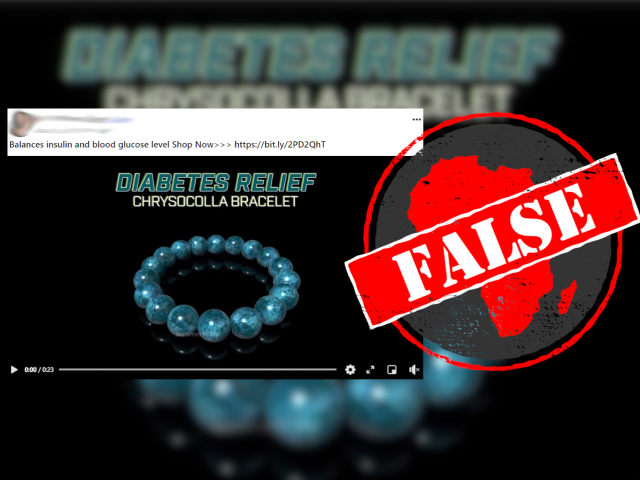IN SHORT: A Facebook post by a herbal medicine practitioner claims that soursop, which can be eaten with beans, can cure diabetes and prostate cancer. But medical experts say the claim lacks scientific evidence.
A video posted on Facebook claims that soursop can cure diabetes and prostate cancer.
It shows Orisatola Ifagbemiro, a Nigerian herbalist, peeling soursop while advising viewers on its benefits.
Speaking in the Yoruba language, Ifagbemiro says: “Do you have prostate cancer or diabetes? Soursop fruit is the cure. If you have a lot of diabetes, eat it and with God's grace, you will be completely healed … Eat soursop, especially with beans, and if you have diabetes, don't worry, it is not a deadly disease.”
The video was posted by the Facebook account Orisatola Ifagbemiro Herbal Medicine LTD, which has over 83,000 followers. It was also posted on the YouTube account of the same name, which has over a million subscribers.
It has received more than 8,700 likes, 445,000 views and 4,500 shares on Facebook, and over 500 views on YouTube.
But can soursop fruit cure diabetes and prostate cancer? We took a closer look.

Understanding the medical conditions
Diabetes is a chronic disease characterised by high levels of blood glucose, or sugar in the blood. Over time, it can cause serious damage to the heart, blood vessels, eyes and kidneys.
According to the US-based medical centre Cleveland Clinic: “It develops when your pancreas doesn’t make enough insulin or any at all, or when your body isn’t responding to the effects of insulin properly.”
Insulin is a substance produced by the human body to control blood sugar levels.
The prostate is a small gland at the base of the bladder in men. The symptoms of prostate cancer include trouble urinating, decreased force in the urine stream, blood in the semen, discomfort in the pelvic area, bone pain and erectile dysfunction.
It can be cured with surgery or radiation therapy if detected early enough.
What is soursop?
Soursop, also known as gaviola, is a plant usually found in tropical areas. In traditional medicine, various parts of the plant, including the fruit, have been used to treat a number of diseases. It contains vitamin C, which is known to boost immunity in humans and improve the body’s defence against pathogens.
The fruit and leaves of soursop contain antioxidants, which help to protect against a variety of diseases and play a role in overall human health. The fruit is said to contain around 83% of the recommended daily amount of dietary fibre, which helps to prevent digestive problems, such as constipation.
One study found that a soursop extract could reduce the size of breast cancer tumours and kill cancer cells, while another study reportedly found that an extract of the fruit could stop the formation of leukaemia cells. However, most of the research that these claims are based on is limited to test-tube studies.
‘Limited evidence, see a medical professional’
Africa Check has debunked other posts claiming soursop can cure several diseases.
Doctors continue to warn that it can cause side effects in some people and can interfere with medication for high blood pressure and other conditions.
Cancer Research UK says there is not enough reliable evidence to show that soursop works as an alternative treatment or cure for cancer. Some chemicals in the fruit could also cause nerve changes and movement problems.
In 2017, the US Food and Drug Administration also warned some US companies to stop making false claims about soursop being an alternative cancer cure. Other trusted cancer organisations such as Cancer Treatment Centers of America and the Cancer Association of South Africa have also refuted these health claims.
Dr Folarin Opawoye, an infectious disease consultant at the Lagos University Teaching Hospital, told Africa Check: “There’s zero scientific evidence that this works, all we have are claims such as this one, by an unknown man, we do not know his qualifications and the basis for his claim.”
He urged patients with either condition to see a qualified medical practitioner instead.
Republish our content for free
For publishers: what to do if your post is rated false
A fact-checker has rated your Facebook or Instagram post as “false”, “altered”, “partly false” or “missing context”. This could have serious consequences. What do you do?
Click on our guide for the steps you should follow.
Publishers guideAfrica Check teams up with Facebook
Africa Check is a partner in Meta's third-party fact-checking programme to help stop the spread of false information on social media.
The content we rate as “false” will be downgraded on Facebook and Instagram. This means fewer people will see it.
You can also help identify false information on Facebook. This guide explains how.



Add new comment